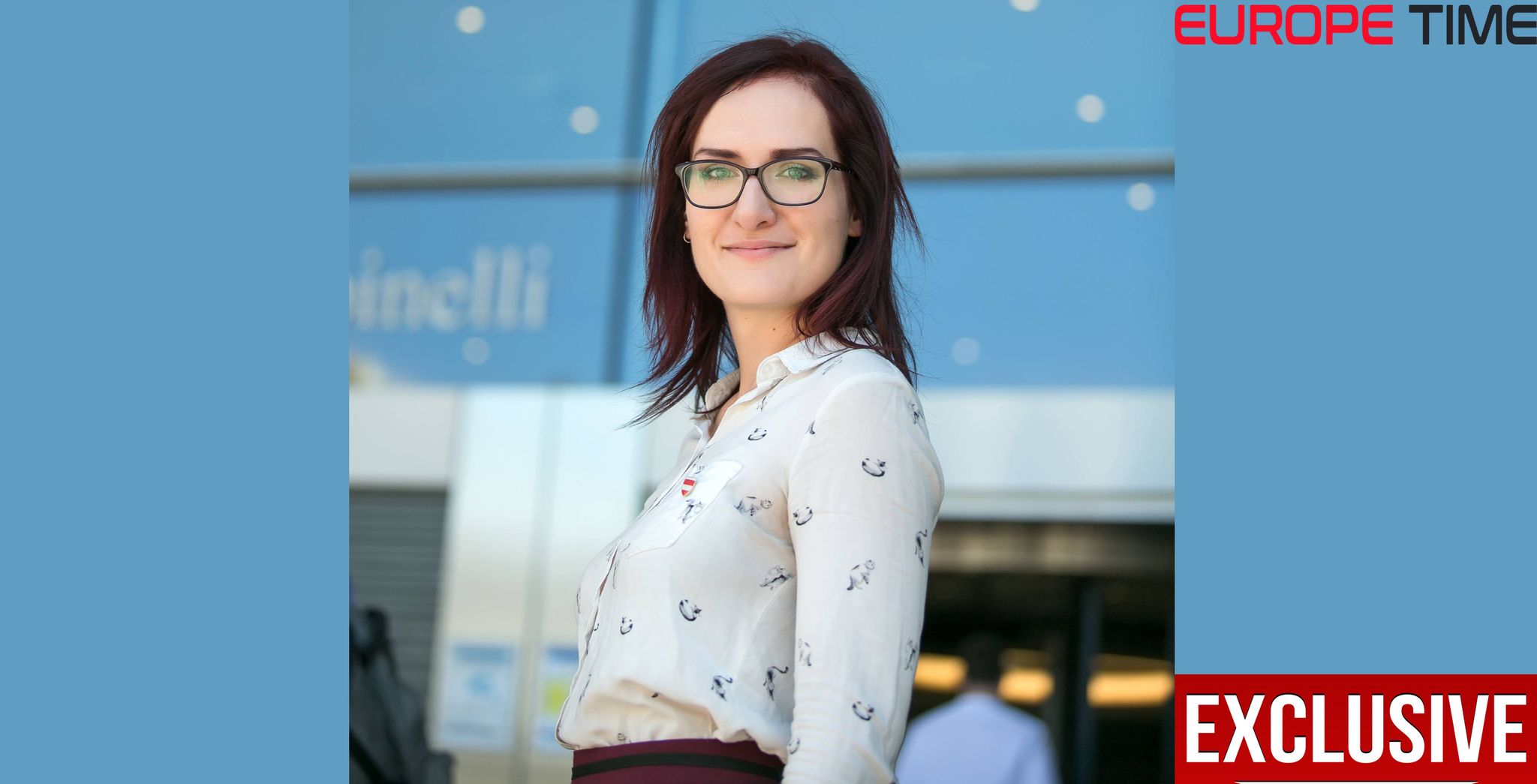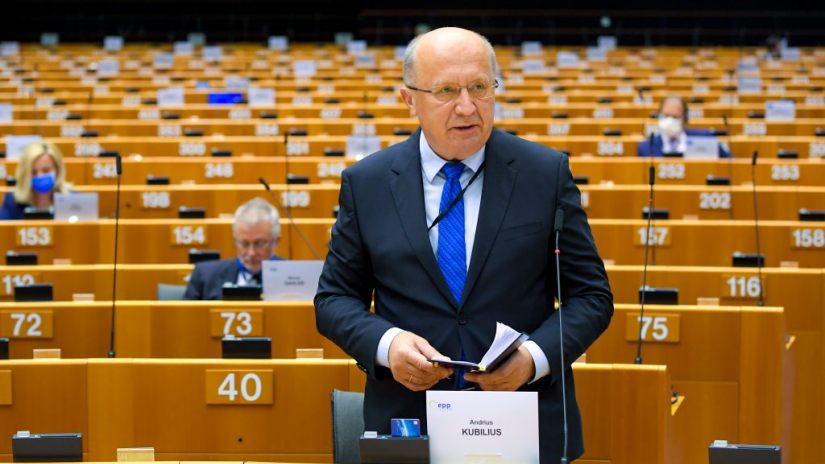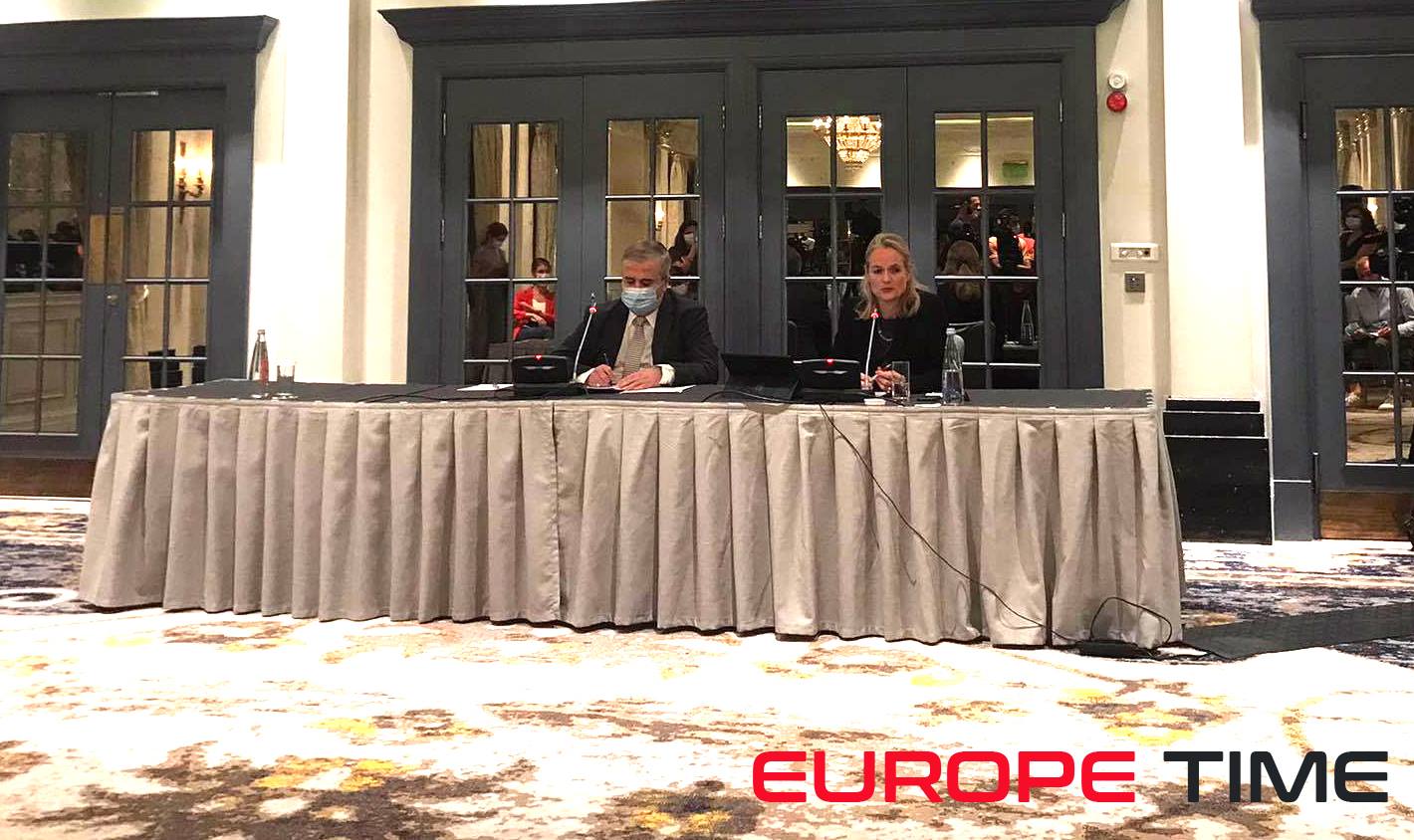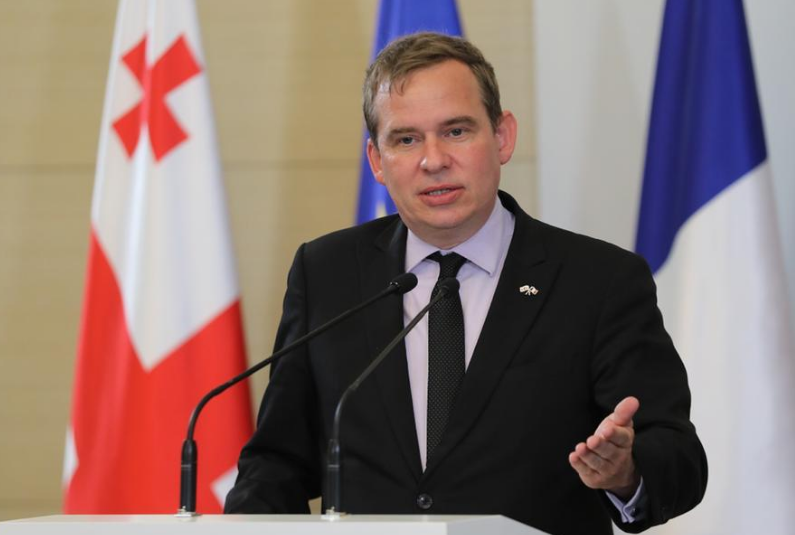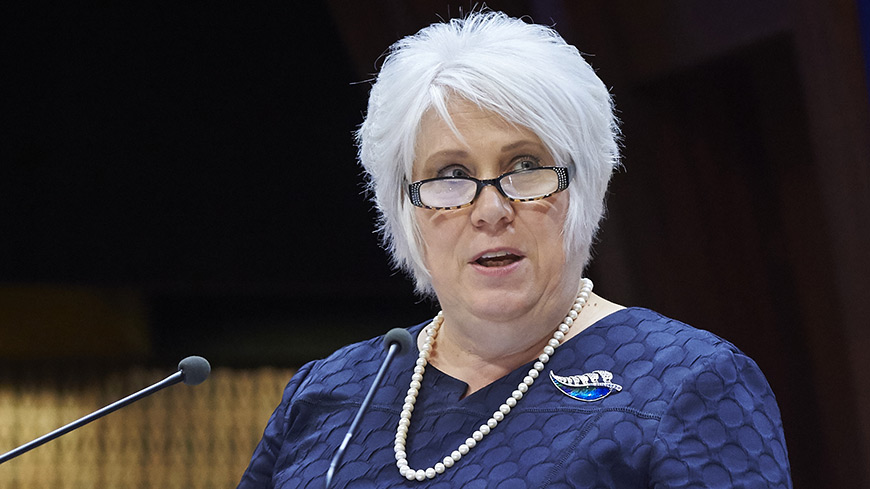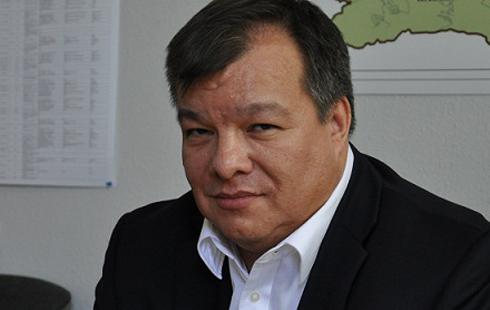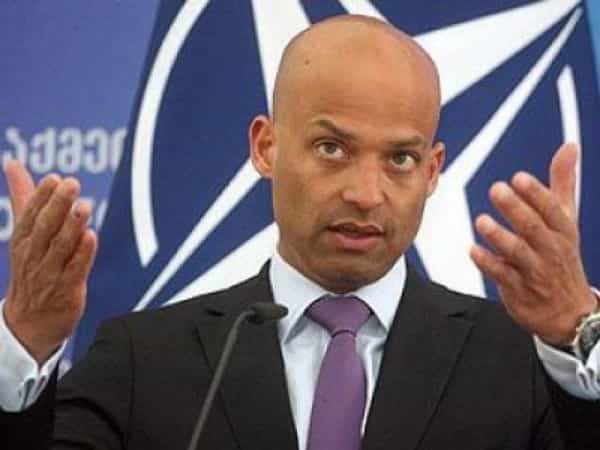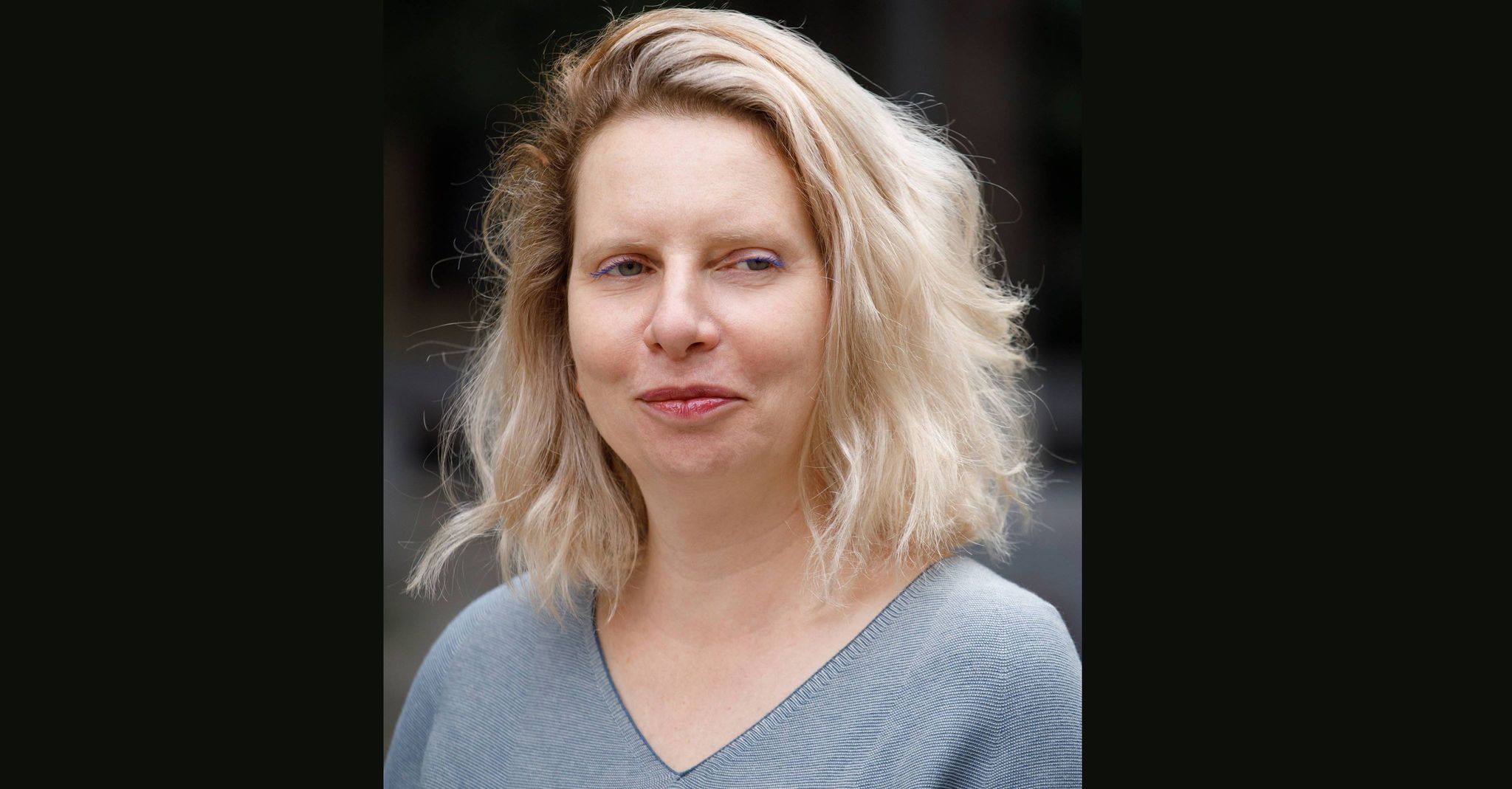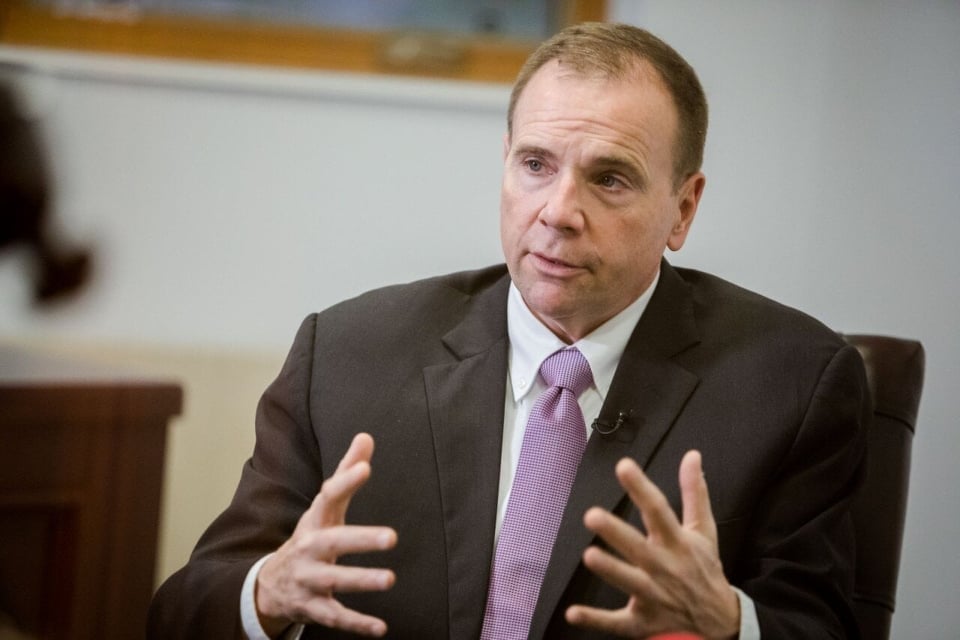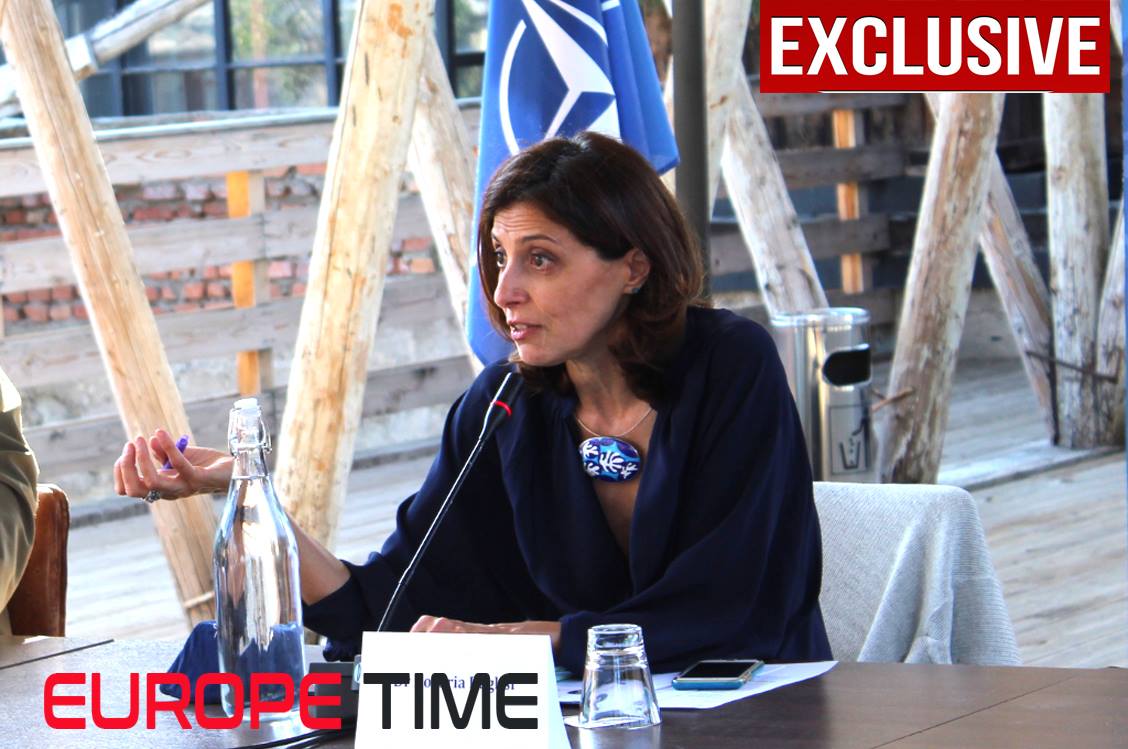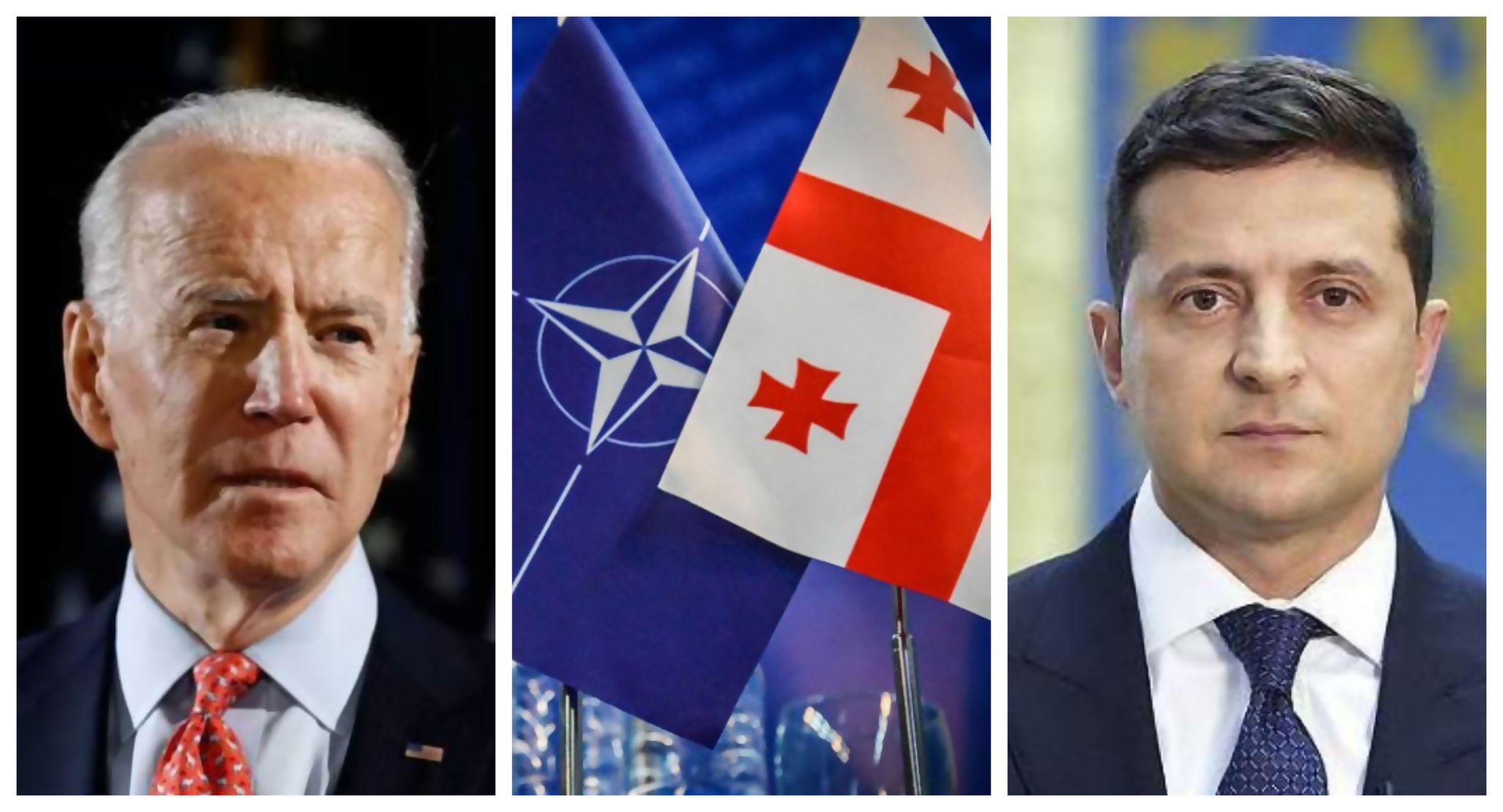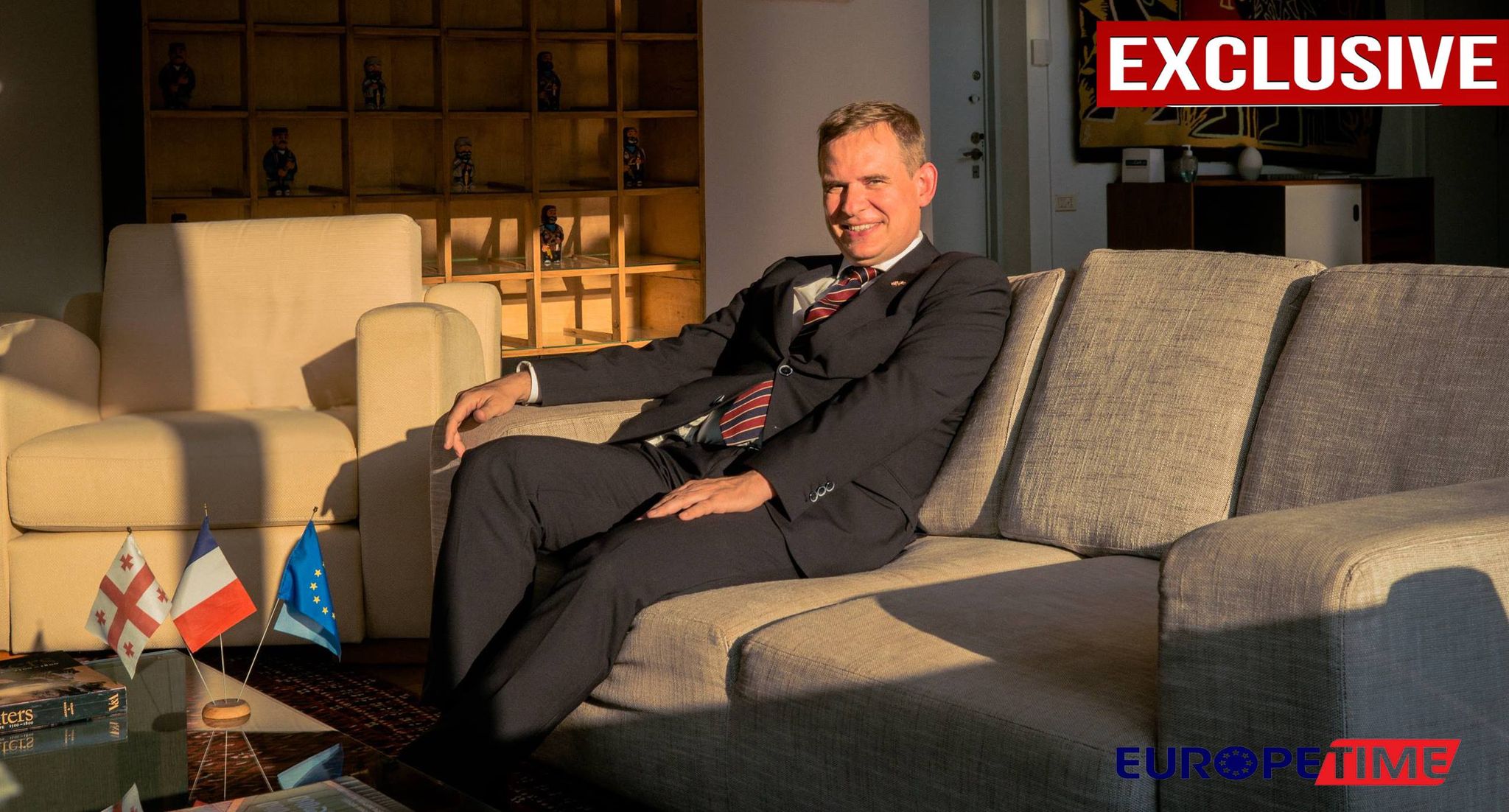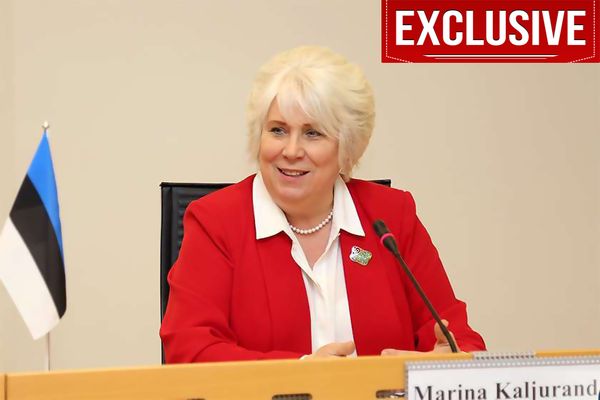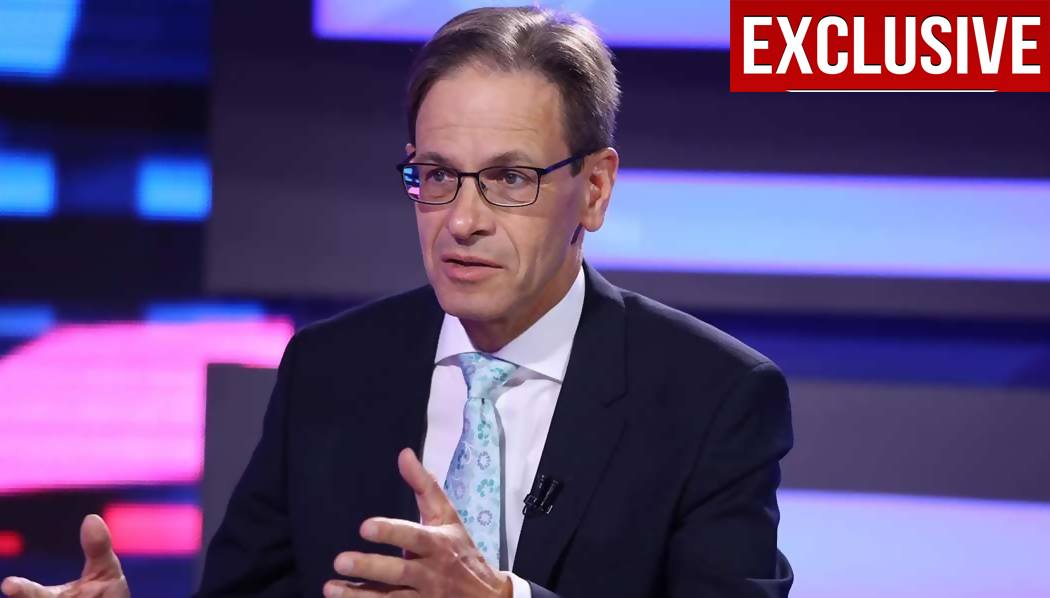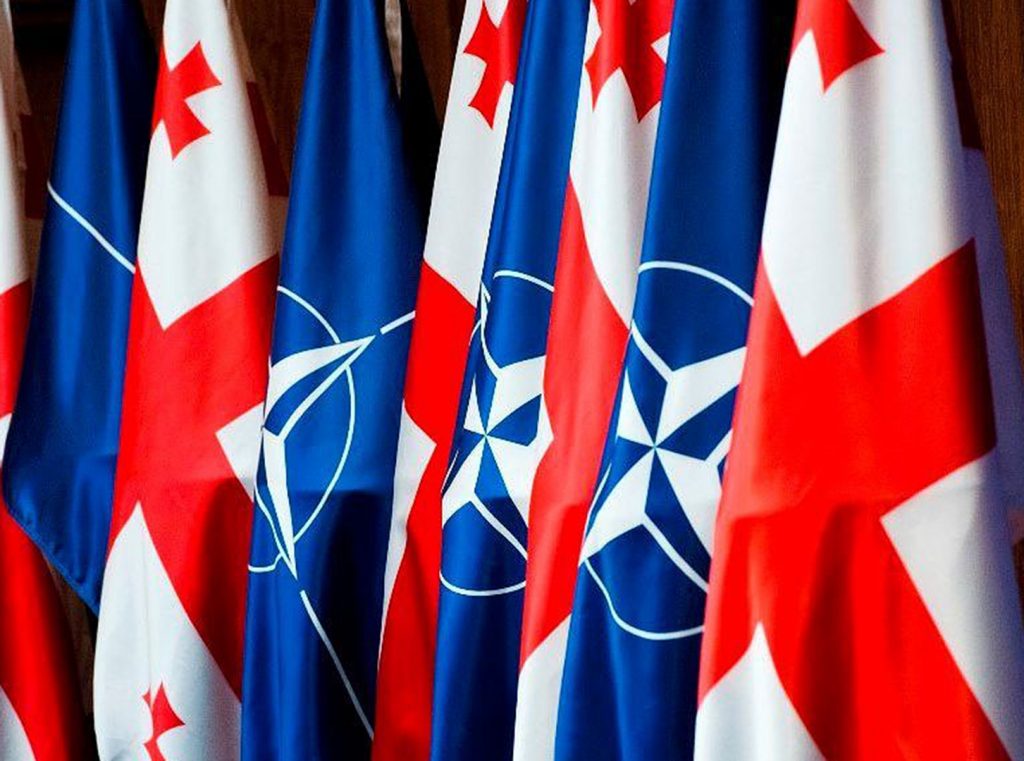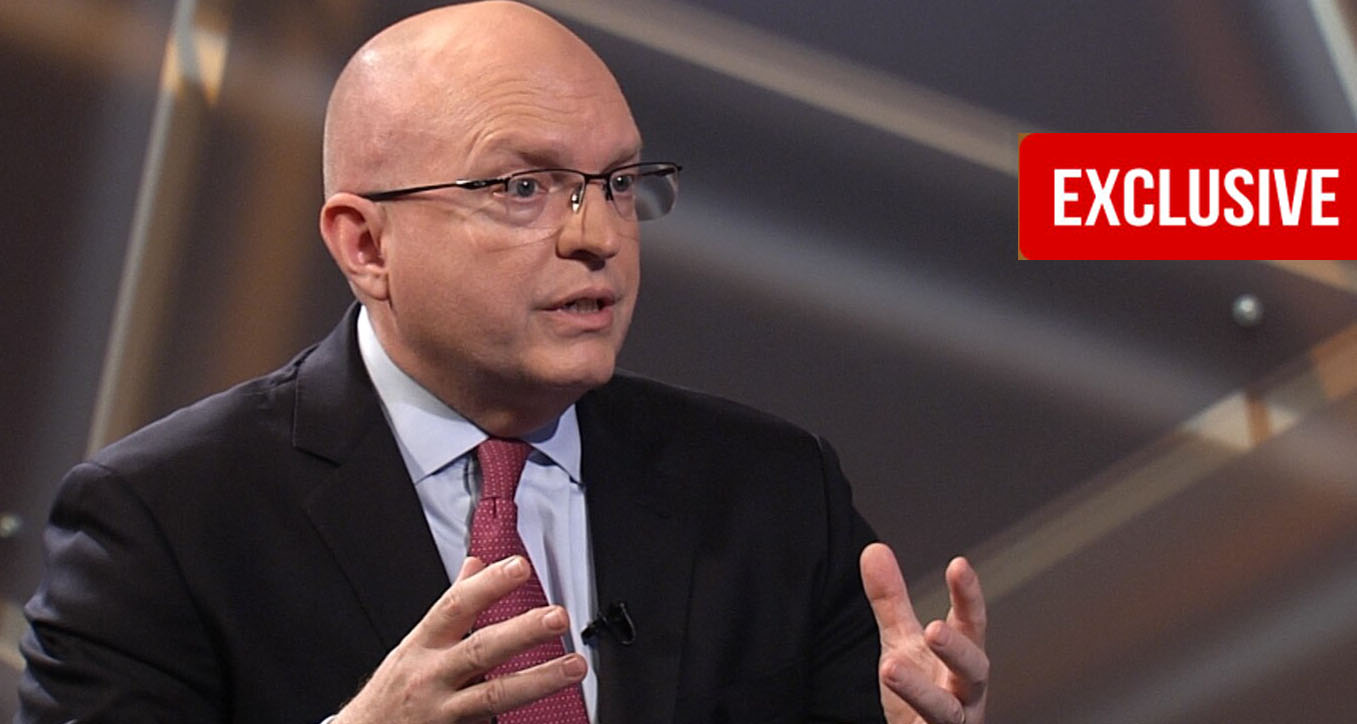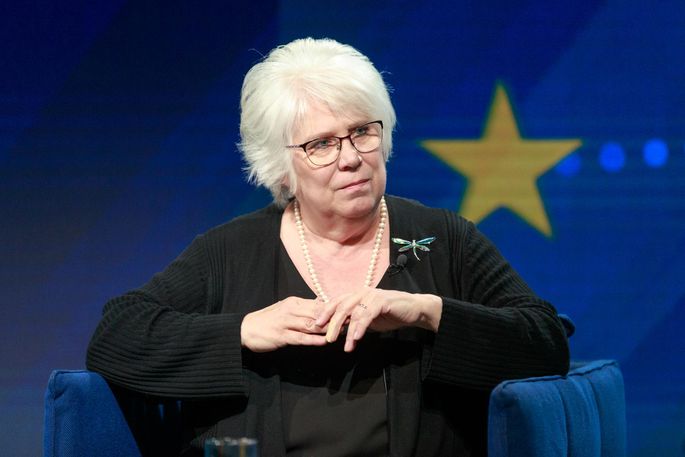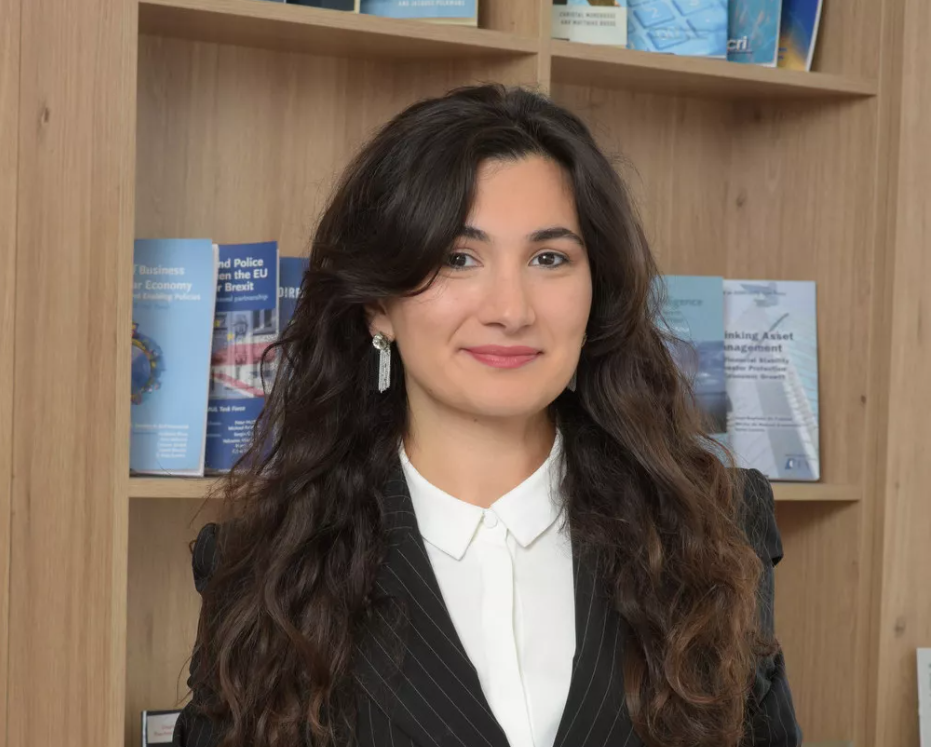Analytics
MEP Markéta Gregorová: Political actors in Georgia should come to one table and come to an agreement
The April 19 Agreement and political developments in Georgia were topics of the Europe Time interview with MEP Markéta Gregorová (Group of the Greens/European Free Alliance). She encouraged political actors to come to one table (Georgian Dream, UNM, and all the others) and come to an agreement: Markéta Gregorová: Honestly, even with Charles Michel being in Batumi before the Georgian Dream decision and giving all this time to a relationship between Georgia and the EU, this kinda seems like a beat in the face of the EU. Because this is considered to be an EU-mediated agreement, simply annulling it shows what Georgian Dream thinks of the relationship with the EU. And it is very disappointing. Of course, there are several possibilities, and microfinance assistance is the obvious one. However, of course, this is something that is done in the standard legislative procedure of the EU. So, it is not something we can do immediately now. It is something we can say that will happen and then when the legislative procedure is going, we can somehow update it based on the current events. Of course, this is also something to discuss among the commission and the council. The problem of complication here is that most of the employees and people from the council and commission are on holiday because the EU institutions are on holiday during August. So, that complicates a swifter reaction. We are going to get in contact with them and see what can be done, but as far as I can see, the atmosphere around the EU institutions is quite different. I feel like this has taken the attention of all of us, and this will definitely have a strong reaction from the EU. _Your colleagues call on Georgian Dream to return to the April 19 agreement, but they are not going to change their decision. In that case, there needs to be an answer from the EU. We cannot be just a tool that is being used when it's convenient. We can be partners, but it is not something that can be used. Of course, if they change their decision, this will be very helpful to the situation, but I do not have any indications that this is going to happen, but that does not mean that I do not wish it. _What would be your advice to the political actors in Georgia? The disagreement between the Georgian Dream and UNM is creating more problems and more divisions and I think they should overcome this division because it is not about them, it is about the country and their citizens and they should come to one table (Georgian Dream, UNM and all the others) and come to an agreement. So, it is helping the country to really stabilize because we did not even like live pandemic situations and problems yet and there are already other problems about the existence of a democratic system and that is very disappointing. Georgia has a plan to apply for EU membership by 2024. We also remember statements that Georgia is farther from the EU than it was 3 months ago. In this regard, how do you view these perspectives? It might seem so, but I do not think that something has changed in how governments and political actors think about the European Union and Europe. So, maybe this will be hard to say, but the fact that the government put it on paper and they have the ambition to ask for accession to the European Union in 2024, I think it has been just on paper from the beginning and it has never been on their mind. Maybe I am not right and I will be happy not to be correct, but so far it seems like that. It is on the paper, but it is not on their actions. Of course, till 2024 is three years. So, there can be all of these developments. We have seen that developments have been just a couple of months ago. But the politics would need to change greatly for the EU to believe the Georgian government. They want to honestly join the European Union. _Will you try to synchronize the decisions with the United States? As I have seen their statements what they think, the US is more disappointed with the developments and exasperated, to be honest. Yes, the talks between the EU institutions and the US are going, but of course, I cannot tell right now what will be the outcome because they do not know the outcome themselves yet. But as for cooperation, we want to help to solve the situation, but we also realize that this is something that we cannot force Georgia to do if the government does not wish so. So, there needs to be bilateral or trilateral will to change the situation.
MEP Andrius Kubilius: I hope all sides in Georgia understand that increased tension puts the country’s future and progress of European reforms at stake
I hope all sides in Georgia understand that increased tension puts the country’s future and progress of European reforms at stake - said Co-President of the Euronest Parliamentary Assembly Andrius Kubilius in a comment with the Europetime. „GD is loosing international trust and, unfortunately, the same is happening with Georgia. The withdrawal of the ruling party from the hard-won April 19 agreement is sending a bad signal. I do not see how this step helps diminish polarisation and ensure political dialogue. International partners are willing to help Georgia on her European reforms path, and the EU has demonstrated that in the personal leadership of Charles Michel, the President of the European Council. The April 19 agreement provided a good basis for that in preparation for the elections. Now there is a void. I hope all sides understand that increased tension puts the country’s future and progress of European reforms at stake and will find a way to overcome the disagreements“, - said Andrius Kubilius. MEP Viola von Cramon-Taubadel: I am afraid, after Georgian Dream's decision to "annul" the April 19th agreement, Georgia is farther from the EU than it was 3 months ago Exclusive: James Appathurai: The decision by Georgian Dream to withdraw from the April 19 Agreement is deeply regrettable Exclusive: Diego Colas: After July 5, the issues on which I focus most of my attention are freedom of the press and the security of journalists, protection of minorities, judicial reform US Embassy: The United States is deeply disturbed and exasperated by Georgian Dream`s withdrawal from the April 19 Agreement
MEP Viola von Cramon-Taubadel: I am afraid, after Georgian Dream's decision to "annul" the April 19th agreement, Georgia is farther from the EU than it was 3 months ago
`I am afraid, after Georgian Dream's decision to "annul" the April 19th agreement, Georgia is farther from the EU than it was 3 months ago`, - Viola von Cramon-Taubadel, Member of the European Parliament, Lead member for Georgia at the European Parliament’s Democracy Support and Election Coordination Group (DEG) said at a news conference. According to her, it does not happen for the first time when the Georgian Dream does not fulfill its promise. `First of all, I want to start by expressing my support to you, Georgian Media, and especially to those 53 journalists who were brutally attacked by violent groups on July 5th. Georgian Dream's statements that failed to properly condemn the impunity or even emboldened the perpetrators are a very dangerous sign of backsliding democracy. Protecting Media, even one as polarized as it is in Georgia, is a fundamental EU value. Other EU values are embodied in its motto "United in Diversity". Diversity means protecting everyone and everything - culture, traditions, religion but also minorities. With all its diversity and regard to the fundamental values of all human beings, Georgia is welcome and respected in the EU. I am afraid, after Georgian Dream's decision to "annul" the April 19th agreement, Georgia is farther from the EU than it was 3 months ago As a lead Member of the European Parliament’s Democracy Support and Election Coordination Group (DEG) for Georgia, I was tasked with leading a high-level mission to support dialogue between Georgian political parties and share European experience. After our full-scale mission in July was canceled due to a very high number of COVID-19 cases, I decided to hold the meetings at the Georgian Parliament without other members of our delegation. Right at this moment, the Georgian Dream made unexpected and, in my opinion, the harmful decision for Georgian interests and withdrew from the agreement. This is in the end why I decided to cancel my meetings at the Georgian Parliament. The April 19th agreement was and is a fundament for the European Parliament's democracy support activities with the Georgian Parliament. This is not the first time the Georgian Dream breaks its promise. "Annulling" the agreement irreparably breaches trust and renders the Georgian Dream unreliable. The excuses for "annulling" the agreement are unpersuasive and unserious. Georgian dream did not fulfill its obligations – appointment of judges without "ambitious judicial reform" is a good demonstration of that. This regrettable decision did not benefit Georgia, its people, its international friends. Georgian Dream's decision benefited the Kremlin. It is clear that we cannot go back to "business as usual". The EU will need to reconsider its relations with the Georgian Government. It is also true that UNM's unconstructive actions and refusal to sign the Agreement gave Georgian Dream a convenient pretext. The people of Georgia deserve better, they deserve politicians who put the country's interests above everything else. Hereby, I commend all opposition parties that stay committed to the agreement and to the obligations they have taken. Lastly, in this context, the upcoming local elections have become even more significant. The EU stands with the People of Georgia in their struggle for a just and democratic state. This is why every Georgian need to exercise their constitutional rights and vote in the local elections. The EU will do everything possible to makes sure that our observers are on the ground and contribute to the transparent elections“, - said Viola von Cramon Taubadel. Exclusive: James Appathurai: The decision by Georgian Dream to withdraw from the April 19 Agreement is deeply regrettable Exclusive: Diego Colas: After July 5, the issues on which I focus most of my attention are freedom of the press and the security of journalists, protection of minorities, judicial reform MEP Andrius Kubilius: I hope all sides in Georgia understand that increased tension puts the country’s future and progress of European reforms at stake US Embassy: The United States is deeply disturbed and exasperated by Georgian Dream`s withdrawal from the April 19 Agreement
Diego Colas: After July 5, the issues on which I focus most of my attention are freedom of the press and the security of journalists, protection of minorities, and judicial reform
"I agree with Charles Michel that upholding the content of the April 19 agreement, in particular in-depth judicial and electoral reforms, offers the best way to strengthen democratic institutions and the rule of law in Georgia,"- Ambassador Extraordinary and Plenipotentiary of the French Republic to Georgia, Diego Colas, said in a comment with Europe Time. „I am not very interested in speculating on the result of the next local election, or in discussing what should be the consequences of this or that score in these elections. I agree with Charles Michel that upholding the content of the April 19 agreement, in particular in-depth judicial and electoral reforms, offers the best way to strengthen democratic institutions and the rule of law in Georgia. After July 5, the issues on which I focus most of my attention are freedom of the press and the security of journalists, protection of minorities against violence and intimidation, extremist groups undermining Georgia’s democratic public order, judicial reform. These are the issues where I hope to see strong signs of commitment to European and Western values from everyone, starting with the authorities", - Diego Colas said. US Embassy: The United States is deeply disturbed and exasperated by Georgian Dream`s withdrawal from the April 19 Agreement
Tomasz Kijewski: I think it is a great time to speed up Georgia’s European integration process
Batumi Conference and trio countries' European path were topics of the Europe Time interview with Tomasz Kijewski, president of the Warsaw Institute. Tomasz Kijewski graduated from international relations at the University of Lodz (scholarship at the Center for Transatlantic Studies in Maastricht, the Netherlands) and post-graduate studies at the National Defense University in Warsaw. Graduate of the national security study program (PASS) at the George C. Marshall European Center for Security Studies (Garmisch-Partenkirchen / Washington DC). He completed a course at the International Energy Agency in Paris and was an International Visiting Advisor on Energy in Calgary. For many years, he served as a diplomat, actively promoting Polish interests in North America. The areas of Tomasz’s expertise include hybrid warfare and asymmetric conflicts, counter-terrorism, and energy security. He is currently preparing his doctoral dissertation (Ph.D.). _What are your expectations from the Batumi conference? We would like to have a deeper understanding of the Georgian Foreign Policy and how Georgia can move faster towards EU integration and strengthen cooperation with European and Western partners. I think it is a very important question right now. Despite the fact that Georgia is on its way to European integration, there are a lot of challenges. _What are the main challenges? The main challenges are always connected with internal policy and the ability to accommodate this path for integration. So, economic development and international cooperation are also key issues. We should focus on building stronger cooperation. This is what we have to do. Not so much on external actors, but strengthening cooperation within institutions, within countries, between Georgia and European Union countries and other western countries. _How do you evaluate trio countries' ambitious goals? I think that the three countries are the most advanced countries of the eastern partnership on their way to European integration. So, I think this is an important time. We should speed up the process because different political changes can happen as we observe the European political landscape. This is a time we should use. We would like to have a deeper understanding of the Georgian Foreign Policy and how Georgia can move faster towards EU integration and more cooperation with European and western partners. I think it is a very important question right now. Despite the fact that Georgia is on its way to European integration, there are a lot of challenges. This is a time we should use. The talks and the process in Georgia are getting closer to the European structures that have been established a long time ago. I think it is a great time just to speed up the integration. It should be done in cooperation between Georgia and the European Union. At the same time, in my opinion, the European Union and other western countries should be flexible when it comes to respecting cultural differences in countries like Georgia, in countries like Poland, and others. The standard of democratization is very important and it should be respected, but I think we can not force countries like Georgia to just make one model of democracy in this sense. So, I think the differences in cultural and political approaches should be preserved and should not be an obstacle to integrating into European structures.
Europetime spoke to MEP Maria Kaliurand on recent developments in Georgia
The current situation in Georgia was the topic of the Europetime comment with the Chair of the delegation to the EU-Georgia Parliamentary Association Committee Marina Kaljurand. He said that `What happened was a tragedy: `and for the moment, we address our sincere condolences to the family and friends of Lekso Lashkarava. I also express our sympathy and solidarity with the LGBTQI+ persons of Georgia and encourage them to continue their fight to assert their rights despite bigotry. Lessons will have to be drawn, and responsibilities established, at the level of government officials and law enforcement agencies over what happened. While I certainly appreciate the authorities’ firm condemnation of violence against media workers after last week’s events - this is not enough. We cannot ignore the fact, that the authorities showed a lack of willingness to provide sufficient police protection to the event, and did not condemn loud and clear menaces and hate speech - a weakness which could have been interpreted by some radical forces as a ‘green light’ to resort to violence. In the future, the authorities will need to safeguard the fundamental freedoms of LGBTQI+ persons, including their right to organize or attend peaceful gatherings. This is indispensable if they want their EU ambitions to be taken seriously in Brussels. That said, we warn against any attempt of politicization / political exploitation of these tragic events, especially by political forces which have never been themselves, advocates of LGBTQI+ rights`, - Said Marina Kaljurand. Marina Kaljurand is an Estonian politician who served as Minister of Foreign Affairs (2015-2016), Earlier, she served as the Ambassador of Estonia to the United States (2011–2014), and in Russia (2007-2011). MEP Marina Kaljurand: Georgia contributes to Europe’s and to the world’s collective security MEP Marina Kaljurand: My message is, not given up your dream to become a member of the EU and NATO
Luis Navarro: The freedoms of assembly, speech, and press, and their application to all citizens are among the essential foundations of true democracies
The freedoms of assembly, speech, and press, and their application to all citizens are among the essential foundations of true democracies said Eurasian Program Fellow for the Foreign Policy Research Institute, Luis Navarro in a comment with Europetime. `The freedoms of assembly, speech, and press, and their application to all citizens are among the essential foundations of true democracies. In its statements and actions, the government has repeatedly, since it has been in power, made clear that if the LGBTQ community, and any allied with its exercise of these rights, do so at their own risk. Now that appears to apply to those who have the right to observe the exercise of these rights, as well. This stands in stark contrast to events like the xenophobic Georgian March in 2017, which also involved priests, and the government shrugged off as the price of freedom. The failure of this government to provide the level of security necessary to meet the violence promulgated by those the Orthodox Church claims not to condone is inexcusable. This failure is not only worse than May 17th, 2013, but it also reflects the failure to deter the mob violence organized by Levan Vasadze in 2019 and threatened in advance of yesterday. Given the government security forces used in the club raids of 2018, the anti-Putin protests in 2019, and even the arrest of Nika Melia earlier this year, it is clear that the government views the human rights of its citizens as conditional to their political views. All of this undermines the government’s claim to support European integration, rather than the anti-Democratic, pro-Russian narratives of those like Viktor Orban`, - said Luis Navarro Tbilisi Pride canceled amid violent protests. LGBT activists in Georgia have canceled a gay rights event after their office was stormed by far-right protesters. Journalists and activists were also attacked ahead of the planned march in the capital Tbilisi.
James Appathurai: I strongly condemn the violence which took place this week. I found these events deeply disappointing and a setback for Georgia
`I strongly condemn the violence which took place this week. I found these events deeply disappointing and a setback for Georgia`, - said in a comment to Europetime James Appathurai, Deputy Assistant Secretary-General for Political Affairs and Security Policy and the NATO Secretary General’s Special Representative for the Caucasus and Central Asia. "I strongly condemn the violence which took place this week, which was directly contradictory to NATO norms and values, including the right to assembly, the rights of minorities, and respect for the media. I have worked for many years to support Georgia’s reforms and its progress towards Euro-Atlantic integration; I found these events deeply disappointing and a setback for Georgia“. Tbilisi Pride canceled amid violent protests. LGBT activists in Georgia have canceled a gay rights event after their office was stormed by far-right protesters. Journalists and activists were also attacked ahead of the planned march in the capital Tbilisi.
Natalia Voutova, Head of the Council of Europe Office in Georgia: Further electoral reform is in the main direction that Georgia needs to undertake
The appointment of Supreme Court judges and the electoral reform were the topic of the Europetime interview with Natalia Voutova, Head of the Council of Europe Office in Georgia. With 25 years of experience working for the Council of Europe and OSCE, she has focused on human rights and legal reforms projects in Armenia, Bosnia-Herzegovina, Bulgaria, Georgia, Russia, Ukraine, and Kazakhstan. Natalia Voutova also worked for Médecins sans Frontières (Doctors without Borders) in Chechnya. She was the Head of the Office to Yerevan (2015-2020), Deputy Head of the CoE Office in Ukraine between 2007 and 2009, and before that the Special Representative of the CoE Secretary-General to Armenia (2002-2004). _Supporting the Criminal Justice Reforms - Tackling Criminal Aspects of the Judicial Reforms in Georgia` project runs from 1 January 2019 until 31 December 2021, what challenges highlighted the project and what was the main progress? This project aims at supporting the Georgian stakeholders in the reforms of the criminal procedure and strengthening the capacity of national courts to effectively exercise judicial control over the application of coercive measures by the prosecution and law enforcement agencies. Moreover, the Project works towards the improvement of analytical and methodological capacities of the justice sector stakeholders to assess the criminal justice’s performance and develop evidence-based criminal policy. In addition, the Project assists in improving international cooperation in criminal matters. Despite the capacity building conducted with the legal professionals, the general picture of the application of preventive measures remains unchanged. According to the statistics published on the website of the Supreme Court of Georgia, the percentage breakdown of the types of preventive measures applied in 2019 and in 2020 is almost identical. In particular, bail and detention are the types of preventive measures that are mainly applied, other measures are as a rule rarely used. In order to identify and take stock of the shortcomings in the criminal procedure legislation, a group of international experts under the auspices of the Council of Europe prepared an opinion proposing further improvement of the procedural legislation. In 2019, the Venice Commission assessed positively the initiative of the Ministry of Internal Affairs for reforming the Criminal Procedure Code in respect of separation of powers between prosecutors and investigators. However, there have been delays in the process. As reported by a number of NGOs, the current legal framework creates risks for ineffective investigative and prosecutorial activities. We hope the work in this regard will restart soon. _The Council of Europe is the continent's leading human rights organization. It includes 47 member states 27 of which are members of the European Union. All Council of Europe member states signed up to the European Convention on Human Rights, a treaty designed to protect human rights, democracy, and the rule of law. How would you assess the steps taken by Georgia as a member to strengthen democracy, human rights, and the rule of law? For example, in general, Democracy is in distress, finds the Council of Europe Secretary General’s annual report for 2021. Let me start from the end of this question, democracy is indeed in distress, but this is a global phenomenon and is a separate question altogether. Georgia is part of Europe and a member state of the Council of Europe; this means that we as partners stand together with the Georgian political parties, civil society, and the public at large to overcome these challenges. Compromises are possible and the challenge to democracy can be overcome when we all work together. As regards human rights, in recent years, one of the most positive steps towards improving the human rights framework was the adoption of the anti-discrimination law (the Law of Georgia on the Elimination of All Forms of Discrimination) in 2014. I should also mention the steps taken by Georgia to improve the conditions of detention in prison and inmates’ access to health care. The country also reduced the high prison population. However, further work needs to be done in this regard. In 2015 the country adopted a Juvenile Justice Code is tailoring the criminal justice system accordingly and introducing higher standards for juveniles in conflict with the law. The adoption of the Code of the Rights of the Child in 2019 and ratification of the Istanbul Convention in 2017 alongside a number of reforms for preventing and combating domestic violence in Georgia should be mentioned as well, although much remains to be done. There are two areas that constitute the foundation for democracy – the electoral and judicial systems. Electoral reform is an area that has been reformed for years. The last year’s constitutional reform, reducing the share of majoritarian MPs in the parliament, and reducing the electoral threshold to 1% was a step forward. _The Venice Commission and the OSCE/ODIHR issued their urgent joint opinion on the draft amendments to the Electoral Code of Georgia. The document also points to a number of progress and recommendations, including the appointment of Supreme Court judges. What progress and shortcomings can we talk about based on these and other documents and how do you view the recommendations implemented by Georgia in this regard? Regarding the amendments to the Electoral Code, as you may know, the Venice Commission and the OSCE/ODIHR have received a new request following the signature of the EU-brokered agreement. We encourage the authorities to ensure that the forthcoming recommendations are duly taken into account. As regards the Supreme Court appointments, indeed, the Venice Commission opined on the Supreme Court-related legislation several times, starting from 2019. In this process, the legislation in Georgia did go through a number of positive changes, in line with the Venice Commission recommendations. The conflict-of-interest rules have been introduced, transparency of the selection and appointment of judicial candidates has been increased and the possibility of appeal has been reflected. Yet, as the most recent, April 2021 Venice Commission Opinion points out “[..] there are a number of outstanding recommendations that should be reconsidered”, mostly on the appeal procedure and the equality of candidates. _What is the main / priority reform that the member state, in this case, Georgia, should provide priority under the commitments of the Council of Europe? Further electoral reform is in the main direction that Georgia needs to undertake. Furthermore, implementation of the fourth wave of judicial reforms and in general upholding the highest standards of ethics and integrity in the judiciary will remain essential throughout 2021 and beyond. It will be important that the selection procedure for Supreme Court judges is brought into line with European standards as soon as possible. Further reform of the High Council of Justice will remain a priority.
Ben Hodges: Georgia’s future depends on its development as the portal between Europe and Eurasia
Georgia’s future depends on its development as the portal between Europe and Eurasia. Europetime spoke to Former commander of the United States Army Europe, Lieutenant General and the Pershing Chair in Strategic Studies at the Center for European Policy Analysis (CEPA), Ben Hodges. According to him, Building ports and other infrastructures such as this terminal are key components of that effort. As it grows, then more Western businesses will move there to build capacity for transit/trade which will lead to their governments taking a much greater interest in security in and around Georgia; and they’ll begin to question why Russian forces are still occupying 20% of Georgia. But Georgia must do all it can to make itself as attractive as possible to foreign investment. Transparency, judicial processes, and reliable labor/power/transportation networks are all part of this. _Dear General, it would be interesting to start the interview with the current developments in the region. In your previous interviews, the leitmotif was that the West should be more actively involved in the ongoing processes in the region and should take clearer steps to demonstrate its position and positioning in the region. A few weeks ago, a US delegation of Senators visited Georgia shortly followed by the official visit of Acting Assistant Secretary of State Philip Reeker, who also paid a visit to Azerbaijan and Armenia as part of the tour. Soon afterwards, the role of Georgia as a mediator was outlined and the country received thanks from Armenia and Azerbaijan… How would you assess these visits, can we consider it as a statement that America is back to the region? These are all positive steps, manifestations of appreciation for the strategic importance of Georgia in the greater Black Sea region and the South Caucasus. But we’ve got to sustain this; it can’t be episodic. I’m especially proud of the American diplomats serving in Georgia now, they are tireless in their efforts and I’m glad to see senior administration / Department of State officials supporting them as well as the support of our Congress. _How would you assess the recent Summit of NATO Leaders that President Biden has also attended? Were there more expectations from this summit, especially with regard to Georgia and Ukraine? It was a good summit… It is important that President Biden removed all doubt about America’s commitment to NATO and to security and stability in Europe. I also thought the new strategic concept, NATO-2030, is good and I’m pleased the alliance will formally accept it at next year’s summit in Madrid. But I was disappointed in the lack of strong, clear language about future membership for Georgia and Ukraine, and about a lack of a clear definition of the strategic importance of the greater Black Sea region. I worry that Ukraine specifically and the Black Sea, in general, is going to endure a long, hot summer, and the reluctance by the West to demonstrate that we care about the region only encourages Kremlin aggression. I was very proud of the performance of HMS DEFENDER last week! That is exactly the sort of step that must be taken to challenge the Kremlin’s illegitimate claims to Crimea. I hope that NATO leaders, including my own president, will show as much resolve as the Commander and crew of HMS DEFENDER. _What effective steps should NATO take to increase stability in the Black Sea and the Balkans taking into consideration the growing Russian threat? Designate it as a strategically important region, further develop graduated response plans and apportion resources to carry out such plans, and improve intelligence sharing with partners as well as allies in the greater Black Sea region. We’ve also got to fix the relationships with Turkey, a long-time reliable ally, but the relationship is not in a good place right now. The USA should take steps to reach out to Ankara and get this fixed. We need to think long-term on this. _NATO troops are leaving Afghanistan by September, at the same time there is a growing argument that the Afghan population could find themselves in a rather dangerous situation. Do you think the Afghan security forces are ready to ensure peace and will this decision lead to an increase of the role of uncontrolled forces and, consequently, Russia’s role in Central Asian countries? Afghan security forces should be able to do this. They’ve benefited from almost two decades of investment, support, and training by ISAF Forces. But the Afghan Government and people need to decide for themselves what they are going to do and what sort of nation they want to be. _You have often mentioned that large infrastructure projects, ports, terminals, railways, and more Western investors are one of the most important ways for Georgia’s integration into the West. A Mineral Fertilizer Terminal has been opened in the port of Batumi recently that was built with direct American investment and the construction of which was strongly protested by pro-Russian forces. Their protest is also clear - Georgia's role on the transit map is growing since this road connects Central Asia to Europe. What can we say about this project and the protest that constantly accompanies such important projects, Anaklia is the biggest example of this. Georgia’s future depends on its development as the portal between Europe and Eurasia. Building ports and other infrastructures such as this terminal are key components of that effort. As it grows, then more Western businesses will move there to build capacity for transit/trade which will lead to their governments taking a much greater interest in security in and around Georgia; and they’ll begin to question why Russian forces are still occupying 20% of Georgia. But Georgia must do all it can to make itself as attractive as possible to foreign investment. Transparency, judicial processes, and reliable labor/power/transportation networks are all part of this. _And the last question, how do you look at and how do you see the current internal processes in Georgia from a distance? Especially perceived by friends, allies, and fans, whether the path the country has taken will lead to a goal, i.e. Euro-Atlantic integration, which in turn requires work and effective steps beyond the declared statements. I believe that Georgia is back on track, though there’s much to be done; but all of Georgia’s friends are ready to help. I’m hoping to be in Georgia this fall, it’s been too long since we could meet and reinforce the effort of each other for a Georgia where young people can achieve their fullest potential.
Head of the NATO Liaison Office in Georgia: Georgia and NATO are doing so many things together. All these joint efforts move Georgia forward towards NATO membership
Georgia and NATO are doing so many things together. All these joint efforts move Georgia forward towards NATO membership. Said Dr. Rosaria Puglisi, Head of the NATO Liaison Office in Georgia in an exclusive interview with Europetime. The NATO summit and other issues were the topics of the Europetime interview with Dr. Rosaria Puglisi. _Can you explain the importance of the 14 June NATO Summit? What are the main takeaways for Georgia and what does it mean that so much attention in the Summit Communique was devoted to Russia? With this Summit, NATO has opened a new chapter. All leaders around the table have said loud and clear that Europe and North America must stand strong together in NATO. This is a powerful message after a complicated period, an indication that the Alliance remains a prime place for transatlantic political dialogue. Reinstating our unity and mutual commitment is especially important at a time when authoritarian regimes, like Russia and China, challenge the rules-based order. It goes without saying that a strong NATO is important for Georgia too. The Summit Communique has very strong language on Russia. It highlights the risks it poses to the Alliance and its partners as a consequence of its continued breach of the values and the commitments that underpin the Russia-NATO relationship. Until Russia demonstrates compliance with international law and its obligations, there is no going back to business as usual–NATO leaders have stressed. With this determination goes also NATO’s reiterated support for Georgia's territorial integrity and the repeated call for Russia to reverse its recognition of Abkhazia and South Ossetia, to end the militarization of these regions and attempts to separate them from the rest of Georgia, and to cease human rights violations, arbitrary detentions, and harassments of Georgian citizens. At the Summit, the Secretary-General repeated in no ambiguous terms that Georgia will become a member of the Alliance and that it has all the practical tools to prepare for eventual membership. With 16 ongoing initiatives and all Allies plus partners, Finland and Sweden involved, the Substantial NATO-Georgia Package (SNGP), for example, is one of those tools. The SNGP is a unique program, a flagship of NATO’s capacity-building support to partners. Through it, NATO and Georgia are working together side by side, on a daily basis to consolidate Georgia's capabilities and prepare the country for its goal of becoming a member of the Alliance. _Providing correct information about NATO is sometimes an issue in a country like Georgia, regularly exposed to deliberate disinformation campaigns also from its northern neighbor. People need to know what we are doing, you said during the meeting organized by the Defense and Security Committee of the Parliament of Georgia in March. What should be done to counter the challenges and threats stemming from disinformation? How to keep strong popular support for NATO membership among the Georgian public? Keeping strong popular support for NATO and countering disinformation on NATO and Georgia's membership perspectives are, in my view, two different things. NATO support ratings in Georgia are very high. In the four years, I have been in this country, I have never seen popular approval for NATO membership go below 68%. The real question is rather what people know about the Alliance and about all the work that NATO and Georgia are doing together to prepare Georgia for membership. Before the Covid pandemics, I used to meet a lot of people, students, teachers, business people, local authorities representatives, in Tbilisi and in the regions. What I always found striking is how little people are informed about all that is going on with NATO. The less people know, the more likely they are to buy the disinformation arguments that nothing is going on, that the alliance is neglecting Georgia, and that Georgia will never become a member. Here you, as a journalist, and I and my fellow Georgian colleagues, as foreign policy practitioners, have a shared responsibility. We have to make sure that information on these crucial processes circulates. Disinformation can be countered only with information. I do not mean propaganda, but information. Georgia and NATO are doing so many things together: from helping build the capacity of the Georgian Coast Guard, to the exchange of information on the security situation in the Black Sea, from establishing a common knowledge of security and defense issues across different Georgianinstitutions to training the Georgian Defence Forces to full NATO standards. All these joint efforts move Georgia forward towards NATO membership. More importantly, however, they make the country better able to defend itself, to protect its territory and its people. In one word, these joint efforts make Georgia more resilient. _We know, that one of the fundamental criteria for alliance membership is the strength of democratic institutions. What do you think, how does NATO assess the quality of these institutions? A: The effective functioning of democratic institutions is indeed one of the distinctive treats of resilience. A country with functional and accountable institutions is better able to withstand hybrid attacks and to protect its people and territory at a time of peace, crisis or conflict. This rule applies not only to Georgia but to all countries in general. It is not surprising, then, that at the Summit, the Alliance reiterated that it stands strong in support of Georgia’s ongoing democratic reforms. Particularly, it welcomed the recent political agreement on the Way Ahead for Georgia and encouraged all parties to stay focused on its implementation. These important reforms, NATO leaders believe, will help Georgia, an aspirant country, to progress in its preparation for membership. Exclusive: NATO welcomes Georgian cross-party declaration ahead of the summit Exclusive: James Appathurai: NATO and Georgia also sharing situational awareness in the Black Sea to ensure that the Black Sea remains a source of stability and security, for NATO Allies and partners
Georgia should take note Biden`s caveat on Ukraine’s NATO membership - Luis Navaro
NATO reiterated its support for Georgian sovereignty, as well as called out Russia’s occupation and actions against Georgia’s citizens. It is also noteworthy, in an apparent response to Pres Zelensky’s demand for a yes or no answer on Ukraine’s membership, that Pres Biden responded to a reporter, “It depends on whether they meet the criteria”. I think the context for this is a function of several challenges, including, Ukraine’s inconsistent effort to address official corruption and the internal backsliding of NATO member nations, such as Poland and Hungary. Georgia should take note of this caveat, and its application to the failures of the government to depart from the nation’s history of prioritizing partisan self-interest in its law enforcement, judicial appointments, and election administration; its antagonistic approach to dissent from the media and civil society; and reliance upon an unelected oligarch over popular will, in its governance. The Georgian opposition, particularly UNM, cannot be in the thrall of a convicted non-citizen, demand European intervention in resolving a political crisis, it helped foment by denying an internationally observed/affirmed election, and then flout European mediation efforts, and expect to be viewed as a constructive alternative. NATO membership will not solve these issues, and it falls to the political class, to work towards achieving the democratic conditions that will both serve its citizens best and facilitate NATO membership“, - Said Luis Navaro.
French Ambassador: The ambitious partnership between NATO and Georgia strongly reaffirmed
The NATO summit was the topic of the Europetime comment with the Ambassador Extraordinary and Plenipotentiary of the French Republic to Georgia Diego Colas. „The NATO summit that just took place was a very important and successful meeting. It was a powerful and useful reminder of what NATO is and of what it does. Among the many important statements and decisions that took place during the Summit, it is right that there was a strong reaffirmation of the ambitious partnership between NATO and Georgia. The important thing now is to implement the many dimensions of this ambitious partnership. This will make Georgia and NATO stronger, and it will effectively bring Europe and Georgia closer together“, - said Diego Colas. Exclusive: NATO welcomes Georgian cross-party declaration ahead of the summit Brussels Summit Communiqué Ambassador Hubert Knirsch: The open-door policy was reconfirmed, explicitly with regard to Georgia Exclusive: French Ambassador: If you ask me about the necessity of a strong Western presence in South Caucasus, I emphatically reply yes
MEP Marina Kaljurand: Georgia contributes to Europe’s and to the world’s collective security
The NATO summit was the topic of the Europetime comment with the Chair of the delegation to the EU-Georgia Parliamentary Association Committee Marina Kaljurand. „The fact that on June 11th, ahead of the summit, all Georgian political parties sitting in Parliament co-signed a joint statement supporting Georgia’s NATO integration, proves, once again, that NATO membership (just like EU membership) is consensual across party lines, which is very positive in itself. Georgia contributes to Europe’s and to the world’s collective security by its substantial contributions to the Alliance’s operations (for example, Georgia is the 4th largest contributor to NATO's Resolute Support Mission to train, advise and assist the Afghan National Defence and Security Forces. Georgia also contributes actively to NATO’s political-military assessment of the Black Sea region). Therefore, comes as no surprise that NATO reiterated in its Communiqué the decision made at the 2008 Bucharest Summit that Georgia will become a member of the Alliance with the MAP as an integral part of the process. The 19 April agreement opens the way for a de-polarisation of the political landscape and a strengthening of democracy and the rule of law, which will allow Georgia to prepare itself in the right conditions for NATO membership“. Marina Kaljurand is an Estonian politician who served as Minister of Foreign Affairs (2015-2016), Earlier, she served as the Ambassador of Estonia to the United States (2011–2014), and in Russia (2007-2011). Brussels Summit Communiqué Exclusive: NATO welcomes Georgian cross-party declaration ahead of the summit Exclusive: Ambassador Hubert Knirsch: The open-door policy was reconfirmed, explicitly with regard to Georgia Exclusive: French Ambassador: The ambitious partnership between NATO and Georgia strongly reaffirmed Exclusive: MEP Marina Kaljurand: My message is not given up your dream to become a member of the EU and NATO
Ambassador Hubert Knirsch: The open door policy was reconfirmed, explicitly with regard to Georgia
The open-door policy was reconfirmed, explicitly with regard to Georgia. German Ambassador to Georgia Hubert Knirsch said in a comment with ‘Europetime’. „The Brussels summit has reconfirmed NATO´s unity and determination to maintain and strengthen security in the Euro-Atlantic area. The open-door policy was reconfirmed, explicitly with regard to Georgia. NATO appreciates Georgia as a close partner and as a country that deserves continued support in the important reforms it conducts“, - Said Ambassador Hubert Knirsch. Hubert Knirsch: Germany has a leading role in the active cooperation in the framework of the Substantial NATO-Georgia Package Exclusive: NATO welcomes Georgian cross-party declaration ahead of the summit Brussels Summit Communiqué
NATO welcomes Georgian cross-party declaration ahead of the summit
NATO welcomes Georgian cross-party joint statement ahead of the summit - said Alliance in a comment with Europetime. “ We welcome this cross-party declaration on NATO. It is another sign that Euro-Atlantic integration is a goal which unites the full political spectrum in Georgia”. Georgian ruling party, opposition sign joint statement ahead of NATO summit.
Philip Reeker: The Anaklia Deep Sea Port and all the biggest infrastructure projects are a great opportunity
The Anaklia Deep Sea Port is a great opportunity, - said Acting Assistant Secretary of State for European and Eurasian Affairs, Philip Reeker, in an exclusive comment with Europe Time. „It is a great opportunity there. Create the environment and if it's for the attraction of investors they will come. This is an investment opportunity. That is why we want to help and support at this moment, "said Philip Reeker. As for the issue of the free trade agreement with the United States. Philip Reeker answered a question by Europe Time in this regard. According to Philip Reeker, strengthening the rule of law and reforms are very important elements that will help Georgia become attractive for international trade. "We appreciate Georgia's desire to boost trade relations with the United States. To do this, it is very important to continue the course of reforms. Among them, the implementation of the April 19 agreement and, consequently, the creation of a more attractive environment for international trade, in which the rule of law plays a very big part. As you know, the issue of free trade is the prerogative of the American Trade Representative. But I want to mention that in this process it is very important to develop a transparent business environment, and this process is going on between them, with our help as well", - said Philip Reeker. „We should encourage more direct investment in Georgia. One would be infrastructure, a particular port project, which is a huge opportunity for infrastructure investment. But also, there are so many other opportunities in agriculture and other commodities, including mining, including manufacturing, said Senator Rob Portman in an exclusive interview with Europe Time. He stressed that it is extremely important that more countries invest in Georgia. „I hope more American companies will do so. One reason some companies are concerned is because of the judicial system. So that is one reason the Judiciary System is important: it provides an opportunity for more prosperity for all Georgians because more foreign investments mean more jobs. One would be infrastructure, a particular port project which is a huge opportunity for infrastructure investment. But also, there are so many other opportunities in agriculture and other commodities, including mining, including manufacturing. So I think there is a great opportunity for more investment here to help Georgian people. Investment is good and we should encourage more direct investment in Georgia, but also more trade. So Georgia's top trade partner is Turkey, and its second is Russia. The United States is a very small part of that, so we need to figure out how to have more supply chains come in from Georgia to America or more exports to America and vice versa. Because I was involved as a United States Trade Representative, that is something I will be working on personally. I hope we can expand our trade-in addition to direct investment, "said Senator Rob Portman in an exclusive comment with Europe Time.
MEP Marina Kaljurand: My message is to not give up your dream of becoming a member of the EU and NATO
The Chair of the delegation to the EU-Georgia Parliamentary Association Committee, Marina Kaljurand, "is a very strong believer in open-door policy". In an exclusive interview with Europe Time, she stated that each nation should have the right to decide their own future and which organizations they wish to join. Marina Kaljurand speaks about Estonias example, "when nobody was expecting us in the EU and NATO. But it was a political decision. We were doing our reforms, we were trying to do our best, so we were waiting for the window of opportunity, and once it was open, we were lucky and happy to take advantage of it. Marina Kaljurand is an Estonian politician who served as Minister of Foreign Affairs (2015–2016). Earlier, she served as the Ambassador of Estonia to the United States (2011–2014) and in Russia (2007–2011). _Thank you for the interview. How do you assess EU-Georgia relations today? Of course, the recent political crisis in Georgia has had some impact on EU-Georgia relations, but I would urge you today to get back on track. Of course, we are following very closely the political developments in Georgia. Next month we will be at the Eastern Partnership Summit. In the autumn, we can look into more details on how far we are in this process. _As it is known, Georgia, Ukraine, and Moldova have signed a memorandum on establishing the Associated Trio. How do you evaluate this step forward by the trio of countries? I would urge you to try all the ways. All methods if it is your aim to have closer integration with the EU. So the cooperation among these three countries is a good thing, but you should also continue your bilateral efforts because the Eastern Partnership is very clear. It provides as much as the Eastern Partners are interested in, and they cooperate in the fields they want to cooperate in. Of course, also for democratic reforms. So, my advice would be to take advantage of all the different formats: the Eastern Partnership as such, the trio as such, and bilateral relations as such. When we are talking about a new format, I think about the close integration of different policies. I had a very good meeting with the speaker, Kakha Kutchava, and he told me that Georgia's future is in accordance with the same projects that we have in the EU. For example, the green deal, digitalization, and economic reforms. So you're trying to align yourself as closely as possible with the policies of the EU. I think this is a very smart approach because it means that we are developing new actions together very quickly, and I think, for example, economic cooperation, there is a lot we can do at the moment. So the economic status of Georgia should be like we have in Norway, Switzerland, Iceland. So, I believe that aligning different policies and formats is also very important. _What should be the main tenets and ideas of these three (trio) countries' new way of life? You should agree among yourself. But I do not see how there can be any closer integration without continuing democratic reforms. The international community and the EU are looking toward judicial reforms in Georgia, constitutional reform, and electoral reform in the same way they are fighting corruption in Ukraine. There are so many reforms where these three countries are on a different level, on advisement. So, while exchanging best practices, exchanging information, and cooperating at that level may be preferable, the EU, of course, urges you to continue with the democratic reforms. like to also say that I think it is important to draw from my country's experience when Estonia was exceeding the EU. For a long time, we were doing reforms to enter the EU. We were not doing that for the EU. We were doing it for our people. So I urged these reforms not because the EU demands it or because the EU wants you to do it. It is just because people want it, and they said it very clearly: they want to live in a society that is very much like the EU, they want to be a part of the EU, they want to be members of the EU. So, continuing the reforms is crucial not only for the EU but also for your people. _Georgia plans to apply for EU membership in 2024. How do you view membership prospects, given your statement that there is no consensus in the EU? I am a very strong believer in the open-door policy. I am a firm believer that each nation should have the right to determine its own future and the organizations to which it wishes to belong. And again, I come from Estonia. Trust me, we have been through that at the beginning of the 90s when nobody was expecting us in the EU and NATO. But it was a political decision. We were doing our reforms, trying to do our best, so we were waiting for the window of opportunity, and once it was open, we were happy to take advantage of it. So my message is to not give up your dream of becoming an EU or NATO member, be prepared, continue reforms, but at the same time, I urge you to be realistic. I do not see consensus in the EU or NATO. Membership is a political consensus. I do not see the consensus in the political parties in the European Parliament. I do not see a consensus among member states. There are very different opinions to the contrary. In Brussels, some states are still saying that enlargement in 2004 was a mistake. So there are so many different opinions. You should be determined to convince the skeptical ones that you deserve to decide a point in the future and that you deserve a unilateral political consensus decision. I do not want to speculate and predict, but personally, I do not think so, because I am speaking of the reality we have today. If it happens, I will be the first one to greet you as a member of the EU and I will be very happy for you, trust me. But I also want to be realistic and frank about the present situation. That’s why I was saying that I think that Georgian leadership should pursue its ambitions but also keep realistic expectations so the people will not be disappointed if they do not get a message by 2024. People will understand it is a process and one day the window will be open. I do not know when, but we should work together for the Georgian people as soon as possible. _We can hope that something will change in the next three years... it has been a long time before I agree. That’s why I do not speculate. I am speaking on behalf of the knowledge that I have today. I am a diplomat and former foreign minister, so I have seen how the accession decisions will be made previously, so that’s why I am trying to be realistic. But you should do everything possible to enter the EU and NATO. You should be persistent in convincing those who are hesitant. It is not about Estonia, because Estonia supports Georgia anyway, but about the countries that are much more hesitant, and I know that they are the big countries of the EU that do not have a treaty of accession today. Just remember what President Macron said. Look at the election in Germany. We do not know the result yet, but we do know the political landscape that will be there after that. We heard the commission's position on enlargement, so these are the signs that have to be taken seriously about – "yes". You have to try everything. You have to do everything to fulfill your dreams. We know that Russia has applied various methods to create a hybrid war against many countries, including Georgia. There are some expert opinions that say the European Union has a more constructive approach. What is your view of these relations, especially amid growth-based aggression from the side of Russia? In 2008, when war broke out, I was Estonian ambassador to Russia (2007-2011). I was an Estonian ambassador in 2007 when Russia had a cyber attack on my country. So I'm not naive about Russia, or about Cyber Challenges, or about information operations. I personally experienced that for years as an Estonian ambassador to Russia. By the way, when Georgia was Russia's enemy number one and I was the Estonian Ambassador to Moscow, we served Georgian wine in my embassy. Since Georgian wine was forbidden in Moscow, we brought it from our supermarket in Tallinn and we served it at the receptions. So I called it a little wine diplomacy in 2008. As for the EU, I think our relations are at the lowest with Russia, but at the same time, they are very frank and open. The visit of Joseph Borell to Moscow, as well as the press conference, were eye-openers for many Western countries hoping for or already having partnership relations with Russia. If you remember, the press conference was embarrassing and Lavrov made it very clear that he was laughing and not taking seriously the EU, its aspirations, human rights protection, the rule of law, and EU principles. That is reality, I think the principles of how we cooperate with Russia should be reviewed, but the basics should be the same. Yes, we have to cooperate with Russia on some topics. Mutual interests, the environment, crime, terrorism, are topics where we can cooperate. Second, we should not close our eyes to things that are happening in Russia. That’s why I am really proud that the EU is still united behind the sanctions introduced for Crimea, as well as the sanctions that followed the arrest of Navalny and recent developments. So, we should continue to remember the things that we do not think are right in Russia. Third, we should continue supporting exchanges, free media, and opposition, because I believe that this is the best way of advancing young people, not to live in society, but to see how democratic societies are functioning and what it means to be a member of the EU. I think this is the future of the younger generation. I do not agree with all the political statements of Navalny, but he has the power to bring the opposition together. Something I did not see in Russia is that the opposition will not reach out to people in the same way that Navalny and the opposition are, and, of course, very concrete and strong responses on cyberattack and information operations; we have the same goal, we have been targets of Russian cyber operations, and we can cooperate very closely here. So, I am really proud that my country has been supporting Georgia. During the war in 2008, I was a cyber expert, and we developed cooperation projects. Georgia is our priority for developing cooperation. So I am really proud that my country is a good friend of Georgia. _The NATO Summit will be in two weeks in Brussels. What could you say about Georgia's expectations? It is a very good question because we all remember the Bucharest summit, which said that Georgia and Ukraine should become NATO members and the next steps should be MAP and you do not have it after 13 years later. The NATO Summit will be in two weeks in Brussels. As with the EU, I would urge you to present your position to work towards receiving positive signals and positive answers from NATO. So, as I have said with the EU, that is a future your people have chosen. And you, journalists, politicians, and civil society, should work in the service of your people and towards the dreams that your people have expressed. So, you have the support of many friends in the EU and NATO.
Researcher at CEPS Tinatin Akhvlediani: The Memorandum demonstrates the readiness of Georgia, Moldova, and Ukraine to speed up their integration with the EU
The Memorandum signed by the three Associated states two days ago demonstrates the will, ambition, and readiness of Georgia, Moldova and Ukraine to deepen and speed up their integration with the EU. Said Tinatin Akhvlediani, Researcher at the Center for European Policy Studies (CEPS) in an interview with Europe Time. `Back in December 2019, the DCFTA states have already issued a statement with the request to launch the dialogue with the EU in the “Trio” format. Yet, the statement was not formally addressed by the EU. In this regard, the new Memorandum is an important step in making the cooperation among the AA countries more systemic and the awaiting response from the EU will demonstrate the EU`s readiness to support speeding up the European integration of the „Associated Trio“, - Said Tinatin Akhvlediani. _Based on the analysis and studies conducted by CEPS with regard to the Eastern Partnership countries, how would you evaluate Georgia's position in terms of relations with the European Union and the implementation of the Association Agreement? Let me start with a report which Michael Emerson and I have prepared last year for the European Parliament to assess Georgia’s Association Implementation. As pointed out in this study, Georgia is well on track with the implementation of its commitments laid down in the Association Agreement. In fact, there are areas in which the country even went beyond its obligations and aligned its legislation with the newest EU laws (for instance, in digital and cyber areas). Our most recent study on the comparison of the Balkan and the EaP states also shows that among the three Associated States, Georgia scores highest in terms of the implementation of the DCFTA. When it comes to political and legal governance, the country’s scores are roughly the same as for Ukraine and Moldova, owing mostly to the anti-corruption reforms actively implemented within the past decade. Up to date, Georgia still remains a relatively incorrupt state in the Eastern Partnership region, yet the most recent developments point to a stagnation in anti-corruption reforms and highlight that the country should reinforce its efforts to eradicate corruption. Moreover, Georgia recorded worsening its political reputation by the lack of democratic accountability, informal governance, and irregularities in the 2018 and 2020 presidential and parliamentary elections. _In your opinion, how did the current crisis impact the EU integration path, and don´t you think that it is crucial to implement reforms that would ultimately affect membership prospects? The current political crisis undoubtedly impacted Georgia’s political reputation and once more made it clear that deepening European integration very much depends on the country’s efforts to guarantee the rule of law, human rights, and democracy. In this respect, the EU has iterated in all its statements that undertaking reforms in the judiciary and the electoral system should be an absolute priority for the country. This was also highlighted in Charles Michel’s detailed proposal on how to resolve political conflict. Therefore, it is unequivocal that Georgia should implement needed reforms and address politicized justice and drawbacks in its electoral and judicial systems. The progress in these areas will be undoubtedly crucial for deepening the relations with the EU. _Internal political crisis by stepping up great efforts and mediation from the side of the European Union may be considered resolved at this stage, in your opinion, to what extent does the end of the crisis paves the way for further progress in the process of EU integration? While the EU has been criticized for being a rather weak geopolitical player in the Eastern Partnership, its active engagement with Georgia importantly reinforced the EU’s visibility and presence in the region. Through its effective mediation, the EU has managed to broker a deal among extremely polarized political parties, which seemed an almost impossible mission to do. Brokering a deal, in the end, highlighted that for both parties, for the EU as well as for Georgia, supporting Georgia’s European integration is strategically important. _Georgia plans to apply for EU membership in 2024. How do you view this prospect? In general, while considering the enlargement the EU follows the accession criteria, so-called Copenhagen criteria which puts forward three main conditions for the EU membership. These are the political criteria covering the stability of institutions guaranteeing democracy, the rule of law, and human rights; economic criteria implying having in place market economy, and administrative and institutional capacity to effectively implement the EU acquis and the obligations for the EU membership. The current political crisis highlighted that Georgia clearly has problems with the first set of conditions and meet political criteria by 2024 might be quite challenging. When it comes to the economic criteria, while Georgia has well advanced in terms of implementing the DCFTA, the Georgian economy overall still remains quite weak and fragile, casting doubts on the negative side effects of the deeper economic integration with the EU’s single market. The institutional capacity of Georgia has its own challenges in the “struggle for good governance”. Therefore, applying for EU membership in 2024 should be quite a challenging plan for Georgia. Apart from fulfilling the accession criteria, Georgia’s membership prospects very much depend on the EU’s political will and the EU’s policy in the Eastern Partnership region. The EU’s new EaP policy published in March 2020 did not promise membership prospects, nor many concrete upgrades in the relations with the EU-associated Trio, Georgia included. Yet the new policy framework put forward areas for enhancing cooperation, such as green and digital transformation. Guiding with the 'more for more' proposition from the EU, Georgia could strategize to deepen sectoral cooperation with the EU in these areas. _Don´t you plan some kind of research on Georgia's relations with the European Union, even within the Eastern Partnership? Well, we quite regularly publish papers, commentaries, and reports on the European integration of Georgia, Moldova, and Ukraine on the dedicated website: https://3dcftas.eu/. Our current studies include the Balkan and Eastern European Comparisons, comparative study across the EaP on the Covid effects on Digital Literacy, and upcoming editions of the trilogy handbooks on the EU-Georgia/Moldova/Ukraine Association Agreements and Struggle for Good Governance. Particularly in Georgia, we are currently working on the ex-post evaluation of the EU-Georgia DCFTA. This will be the first ex-post evaluation of the DCFTAs, commissioned by the European Commission, DG Trade, and it will bring quite interesting insights on the effects of the DCFTA on Georgia’s economic, social and sustainable development as well as the EU’s trade and neighborhood policies. The final report will be published in a years’ time, yet before then, your readers might consult the study website: https://www.dcfta-evaluation.eu/. Your readers might also find it interesting to read my blog written for the Georgian Institute of Politics on the new Eastern Partnership policy and Georgia’s Deliverables for 2020.
Ambassador Ran Gidor: Israel aspires to a complete cessation of hostilities
„Israel aspires to a complete cessation of hostilities and the civilian populations on both sides are pining for peace“, - Said Ambassador Extraordinary and Plenipotentiary of Israel to Georgia Mr. Ran Gidor in an interview with Europe Time. He also said that the Israeli government is also mindful of the need to create effective deterrence: _The United Nations speaks about the danger of a "full-scale war" in the Middle East. In the interview, you mentioned once the need for pressure on Hamas from the international community, what exactly should this activity be expressed? Hamas needs to understand that there is ‘zero tolerance’ among the international community towards terrorism, the indiscriminate shelling of civilian population centers, and the use of violence. Moreover, some rogue states (such as Iran), who continue to support Hamas (which is formally listed as a ‘terrorist organization’ in the US, EU, Canada, Australia, etc.), need to face the grim consequences of their choices. _International leaders speak about the need for de-escalation and make relevant calls. How do you find out the ways and steps towards de-escalation? Naturally, Israel aspires to a complete cessation of hostilities and the civilian populations on both sides are pining for peace. However, the Israeli government is also mindful of the need to create effective deterrence. Israel did not start this conflict, but rather – was taken by surprise at the sudden and unprovoked launching of rockets into its territory. Therefore, we need to try and make sure that Hamas will never again be tempted to undertake such an attack or start such a catastrophic adventure. Otherwise, we’d be doomed into an endless cycle of violence. _Bilateral relations are actively developing with all major spheres between Israel and Georgia, including regular bilateral and multilateral political dialogue, cooperation between the legislatures, inter-parliamentary friendship groups have been established. How do you assess these relations and what do you consider the main priority? Israeli-Georgian bilateral relations have always been excellent, as is evident by the overwhelming support we have been enjoying among all levels of Georgian society since the beginning of the current conflict. However, I think that too much stress has been placed on our glorious, shared past of 26 centuries of coexistence, and not enough effort has been made towards injecting our bilateral relations with fresh substance. Dialogues, friendship groups, and bilateral visits are all important in themselves, but ultimately they need to lead to practical results. Currently, our bilateral trade is minuscule (42 million USD in 2019) and the level of investment is quite low. Therefore, for me – the top priority is to use Israeli expertise in order to support the incipient Georgian high-tech ecosystem, to lay down the necessary framework of agreements that would boost bilateral trade and investment, and to support the creation of agricultural, scientific, and industrial joint-ventures. Moreover, last month (April 2021) Israelis were the second biggest group of foreign visitors to Georgia (after Turkey), and in 2019 more than 200,000 of my compatriots visited this country. Whereas Israeli tourism is an enormous source of revenue and jobs for the Georgian economy, we need to make Israelis realize that Georgia has so much more to offer than just khachapuri, khinkali and good wine. _Israel is a leading country in terms of vaccination, is there any additional program/project planned in terms of sharing experience? We know that the Embassy of Israel and the Agency for International Development (MASHAV) have made great efforts to assist Georgia in the fight against COVID19. Since the beginning of the pandemic, the Israeli embassy and MASHAV have made large contributions to all the relevant bodies fighting the spread of COVID19 in Georgia. We have supported NCDC (National Centre for Disease Control), the Georgian Red Cross Society, and the Georgia office of the WHO (World Health Organization). We have also invited some top Georgian public health experts to take part in an international forum convened by MASHAV on a bi-weekly basis in order to share best practices and lessons learned. Additionally, MASHAV (which has been operating in Georgia since 1992) has so far trained over 1,500 Georgian women and men in a wide spectrum of academic and professional disciplines, ranging from agriculture – to innovation & entrepreneurship – to public health. We will continue to support our Georgian friends and partners throughout this difficult period.


